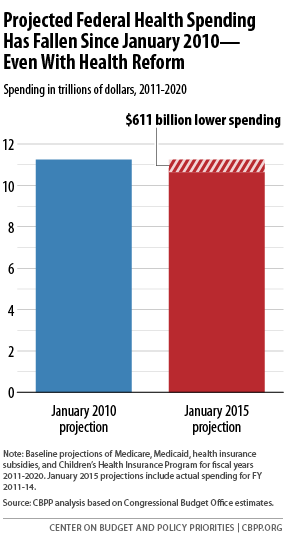BEYOND THE NUMBERS
Projected Health Spending Has Fallen Since 2010, Even With Health Reform’s Coverage Expansions
The Congressional Budget Office (CBO) now projects that federal health spending — including the costs of health reform’s coverage expansions — will be about $600 billion less over 2011-2020 than CBO projected in January 2010 without health reform (see figure).

The decline in projected spending, which continues a pattern of downward revisions to CBO’s projections in recent years, stems from several factors. One is health reform’s cuts in payments to Medicare providers and health plans. Another is the recession, which has reduced the demand for health care services by slowing income growth.
But CBO and other experts have also concluded that a substantial part of the health care cost slowdown reflects structural changes in the health care system. Professional associations, hospitals, and doctors are taking steps to curb costly and ineffective procedures and treatments.
CBO’s new report says, “Although views differ on how much of the slowdown is attributable to the recession and its aftermath and how much to other factors, the slower growth has been sufficiently broad and persistent to persuade [CBO and the Joint Committee on Taxation] to significantly lower their projections of federal health care spending.”
Health reform itself has most likely contributed to the slowdown as well. As Kaiser Family Foundation President Drew Altman has written, “Even though its direct effects on system-wide costs may be limited so far, I believe Obamacare is having a significant indirect effect, although cause and effect and the magnitude are hard to prove. . . . [It] is entirely likely that Obamacare has played and will continue to play a role in the slowdown in health-care cost growth and accelerating market change.”
To be sure, federal health spending — even if cost growth remains moderate — will keep rising as more baby boomers become eligible for Medicare and Medicaid. Making the U.S. health care system more efficient thus remains a major budget challenge. But CBO’s latest projections show that we’ve already made substantial progress.
